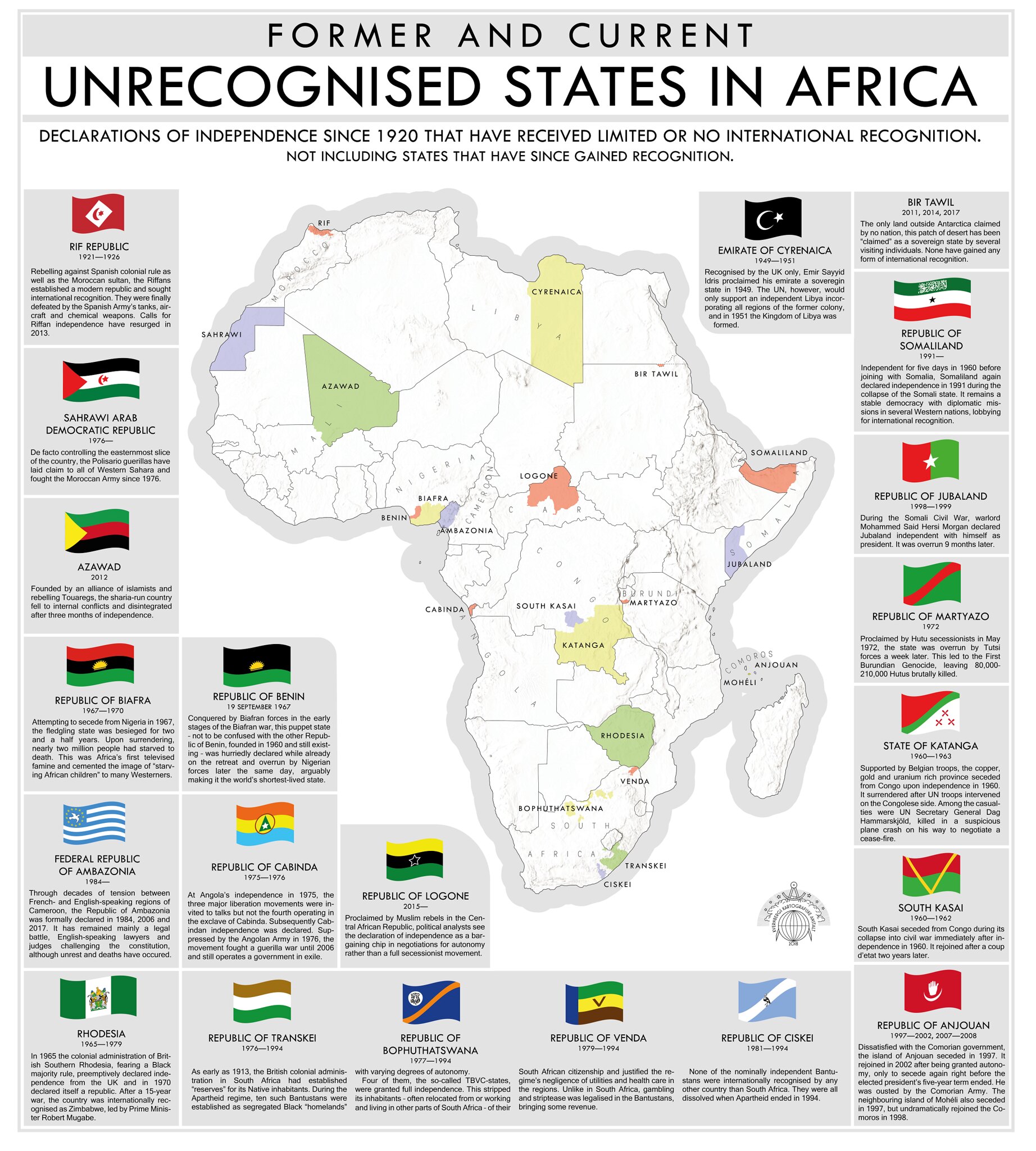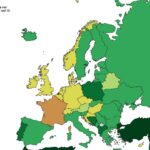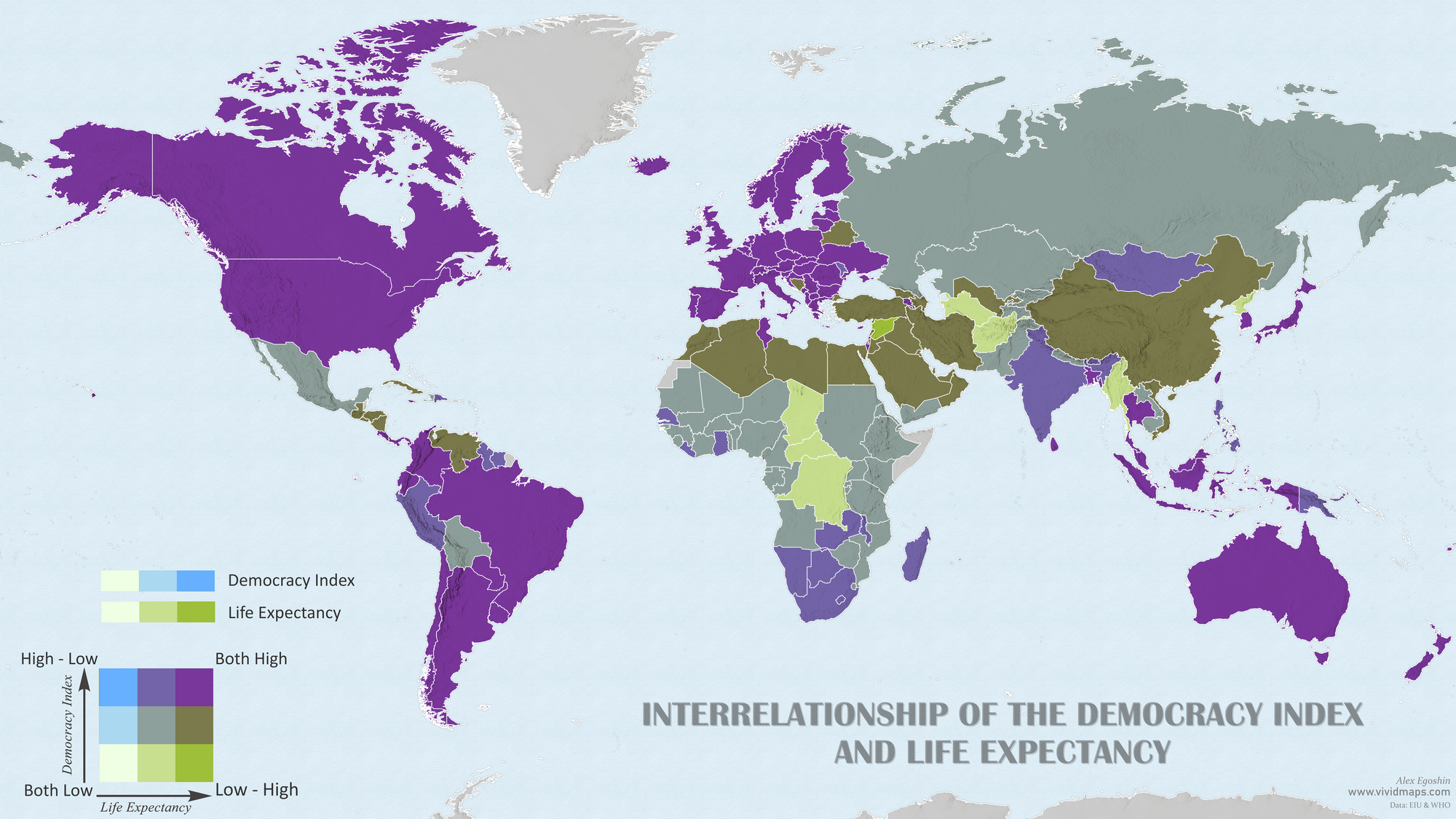Former and current unrecognised states in Africa
The consequences of colonialism continue to shape Africa’s political landscape, leaving behind a legacy of unrecognized states and contested sovereignties. This post examines declarations of independence in Africa since 1920 that received limited or no international recognition, excluding those that have since gained full statehood.

RIF REPUBLIC
1921—1926
Rebelling against Spanish colonial rule as well as the Moroccan sultan, the Riffans established a modern republic and sought international recognition. They were finally defeated by the Spanish Army’s tanks, aircraft, and chemical weapons. Calls for Riffan independence have resurged in 2013.
SAHRAWI ARAB DEMOCRATIC REPUBLIC
1976-
De facto controlling the easternmost slice of the country, the Polisario guerillas have laid claim to all of Western Sahara and fought the Moroccan Army since 1976.
AZAWAD
2012-
Founded by an alliance of Islamists and rebelling Touaregs, the Sharia-run country fell to internal conflicts and disintegrated after three months of independence.
REPUBLIC OF BIAFRA
1967-1970
Attempting to secede from Nigeria in 1967, the fledgling state was besieged for two and a half years. Upon surrendering, nearly two million people had starved to death. This was Africa’s first televised famine and cemented the image of “starving African children” to many Westerners.
REPUBLIC OF BENIN
19 SEPTEMBER 1967
Conquered by Biafran forces in the early stages of the Biafran war, this puppet state not to be confused with the other Republic of Benin, founded in 1960 and still existing – was hurriedly declared while already on the retreat and overrun by Nigerian forces later the same day, arguably making it the world’s shortest-lived state.
THE FEDERAL REPUBLIC OF AMBAZONIA
1984-
Through decades of tension between the French- and English-speaking regions of Cameroon, the Republic of Ambazonia was formally declared in 1984, 2006 and 2017. It has remained mainly a legal battle, with English-speaking lawyers and judges challenging the Constitution.
REPUBLIC OF CABINDA
1975-1976
At Angola’s independence in 1975, the three major liberation movements were invited to talks but not the fourth operating in the exclave of Cabinda. Subsequently, Cab-Indan independence was declared. Suppressed by the Angolan Army in 1976, the movement fought a guerilla war until 2006 and still operates a government in exile.
REPUBLIC OF LOGONE
1974-1994
Proclaimed by Muslim rebels in the Central African Republic, political analysts see the declaration of independence as a bargaining chip in negotiations for autonomy rather than a full secessionist movement
RHODESIA
1965—1979
In 1965 the colonial administration of British Southern Rhodesia, fearing a Black majority rule preemptively declared independence from the UK and in 1970 declared itself a republic. After a 15-year war, the country was internationally recognized as Zimbabwe, led by Prime Minister Robert Mugabe.
BIR TAWIL
2011,2014,2017
The only land outside Antarctica claimed by no nation, this patch of desert has been “claimed” as a sovereign state by several visiting individuals. None have gained any form of international recognition.
REPUBLIC OF SOMALILAND
1991-
Independent for five days in 1960 before joining with Somalia, Somaliland again declared independence in 1991 during the collapse of the Somali state. It remains a stable democracy with diplomatic missions in several Western nations, lobbying for international recognition.
REPUBLIC OF JUBALAND
1998-1999
During the Somali Civil War, warlord Mohammed Said Hersi Morgan declared Jubaland independent with himself as president. It was overrun 9 months later.
REPUBLIC OF MARTYAZO
1972
Proclaimed by Hutu secessionists in May 1972, the state was overrun by Tutsi forces a week later. This led to the First Burundian Genocide, leaving 80,000-210,000 Hutus brutally killed.
STATE OF KATANGA
1960-1963
Supported by Belgian troops, the copper, gold, and uranium-rich province seceded from Congo upon independence in 1960. It surrendered after UN troops intervened on the Congolese side. Among the casualties was UN Secretary-General Dag Hammarskjold, killed in a suspicious plane crash on his way to negotiate a cease-fire
SOUTH KASAI
1960-1962
South Kasai seceded from Congo during its collapse into civil war immediately after independence in 1960. It rejoined after a coup d’etat two years later.
REPUBLIC OF ANJOUAN
1997-2002, 2007-2008
Dissatisfied with the Comorian government, the island of Anjouan seceded in 1997. It rejoined in 2002 after being granted autonomy, only to secede again right before the elected president’s five-year term ended. He was ousted by the Comorian Army. The neighboring island of Mohdli also seceded in 1997, but undramatically rejoined Comoros in 1998.
EMIRATE OF CYRENAICA
1949-1951
Recognized by the UK only, Emir Sayyid Idris proclaimed his emirate a sovereign state in 1949. The UN, however, would only support and independent Libya incorporating all regions of the former colony, and in 1951 the Kingdom of Libya was formed.
REPUBLIC OF TRANSKEI
1976-1994
REPUBLIC OF BOPHUTHATSWANA
1997-1994
REPUBLIC OF VENDA
1979—1994
REPUBLIC OF CISKEI
1981-1994
As early as 1913, the British colonial administration in South Africa had established “reserves” for its Native inhabitants. During the Apartheid regime, ten such Bantustans were established as segregated Black “homelands” with varying degrees of autonomy.
Four of them, the so-called TBVC states, were granted full independence. This stripped its inhabitants – often relocated from or working and living in other parts of South Africa – of their South African citizenship and justified the regime’s negligence of utilities and healthcare in
the regions. Unlike in South Africa, gambling and striptease were legalized in the Bantustans, bringing some revenue.
None of the nominally independent Bantustans were internationally recognized by any other country than South Africa. They were all dissolved when Apartheid ended in 1994.









Thank you for this list and excellent summaries! Could you please indicate when this page was last updated? I’d like to cite it as a reference, but I’m required to list the “last updated” date in the citation. Since this is a common requirement, you might want to consider adding a “last updated” field to your articles so people can cite them (and others would then visit your site to read further :-).